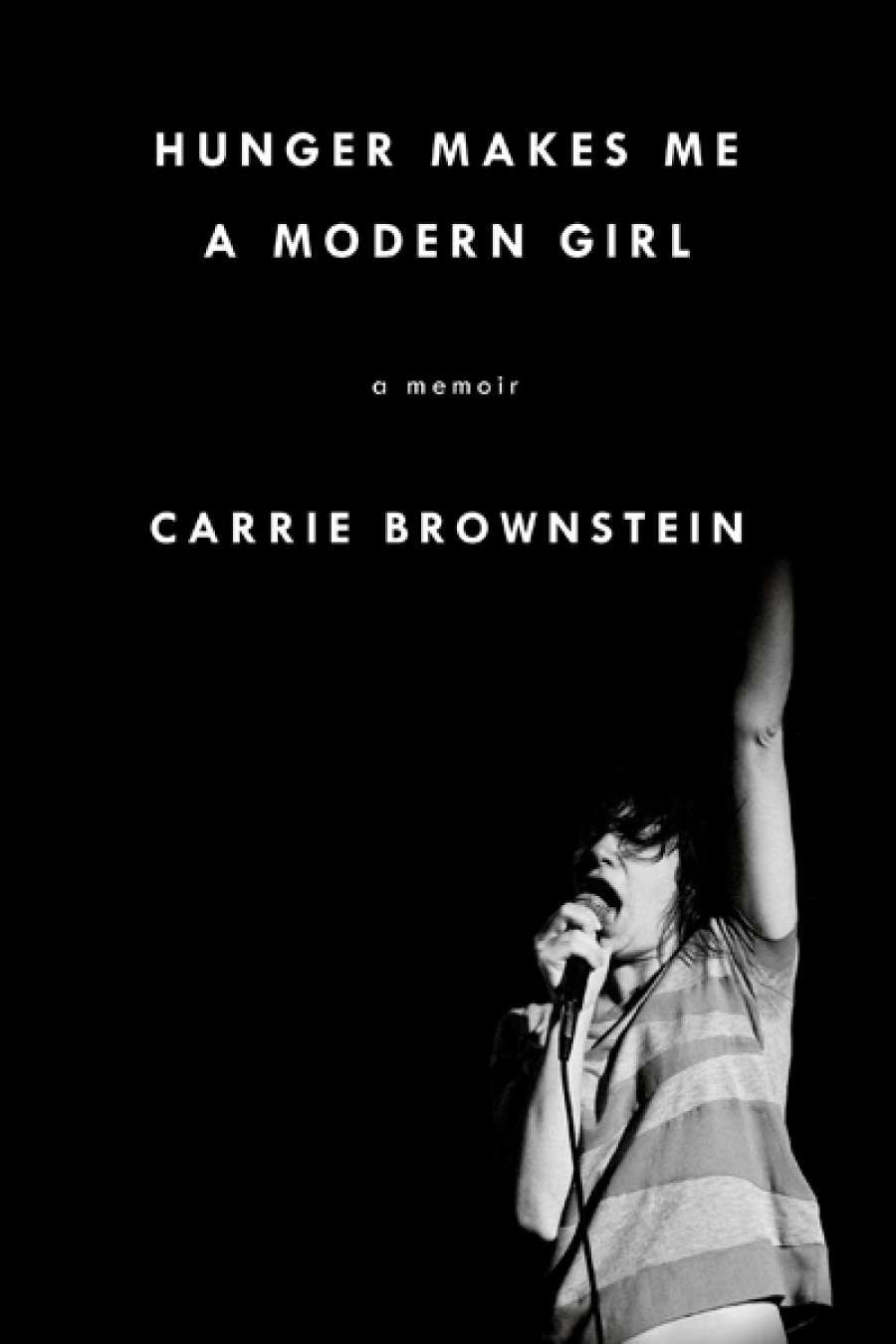
- Free Article: No
- Contents Category: Biography
- Custom Article Title: Anwen Crawford reviews 'Hunger Makes Me a Modern Girl' by Carrie Brownstein
- Review Article: Yes
- Online Only: No
- Book 1 Title: Hunger Makes Me a Modern Girl
- Book 1 Biblio: Virago, $32.99 pb, 254 pp, 9780349007939
'We went to the other side of the world to make our own sound,' Brownstein observes, and this restless pursuit of the unfamiliar and discomfiting has remained a hallmark of the band. Named after an Olympia road intersection, the music of Sleater-Kinney pulls in competing directions: Brownstein and Tucker sing and play simultaneously, but they rarely sing the same words, or play the same notes. Each song feels like a conversation about to become an argument, and the whole is held together, with maximum skill and ferocity, by long-time drummer Janet Weiss, who joined in 1997, the practicalities of flying out a Melbourne-based band member for every American tour having proved insurmountable.
Hunger Makes Me a Modern Girl arrives at a moment of increased personal fame for Brownstein. In 2005, Sleater-Kinney entered a hiatus that threatened to be permanent (they returned in 2015, with their eighth album) and in recent years Brownstein has become known, alongside her friend Fred Armisen, as a producer, writer, and performer for the Emmy-nominated television comedy Portlandia. Soon to enter its sixth season, the sketch show makes gentle fun of the same cultural pieties (punk rock, vegan food, feminist bookstores) from which Sleater-Kinney was born. Portlandia is hardly mentioned in Brownstein's memoir, with most of the book taken up in telling the story of Sleater-Kinney, as if to reassert the pre-eminence of that creative achievement in her life.
Brownstein writes perceptively and with vividness about her experience of music. As a young teenager at a George Michael concert, she longed to 'be the object of desire [rather] than dole it out from the sidelines'. Music has given her an unparalleled means of expression, and, in live performance, a way of living within the moment. On stage she has been able to lose – or possibly find – herself, only to feel, afterwards, 'so small, so unqualified' in the face of her fans, who, like her, are searching for a way to transform themselves. She is aware that the intensity of longing which an audience can carry is not a hunger she can satiate, at least not permanently.
 Sleater-Kinney in 2015 (photograph by SLEATER92 via Wikimedia Commons)
Sleater-Kinney in 2015 (photograph by SLEATER92 via Wikimedia Commons)
There is another, more literal hunger in Brownstein's memoir (the book's title is taken from a Sleater-Kinney song), and it, too, is driven by an impossible desire for transformation. Brownstein's mother, Linda, suffered from anorexia; when Brownstein was fourteen, her mother spent nearly a month as a patient in an eating disorders unit. Within a year of that hospitalisation, she had left the family for good. Brownstein disguised her confusion and hurt with a precocious, play-acting version of maturity, lending an ear to friends' parents in her neighbourhood of Redmond, Washington, as they 'opened up about a recent MS diagnosis, spousal drinking, and kitchen remodels'. Like many children of troubled parents, she felt herself compelled to perform like a reliable adult.
'She is aware that the intensity of longing which an audience can carry is not a hunger she can satiate'
But Brownstein was a performer long before the break-up of her family, a child who demanded to dance and sing for visitors, who staged elaborate dress-up parties and wrote 'inappropriately long letters' to daytime soap stars. Portlandia – in which Brownstein and Armisen play a rotating cast of characters, complete with silly wigs and costumes – seems like a logical extension of this childhood self, which makes its near-absence from this book more puzzling. Brownstein's parents, too, almost disappear from the book after the opening chapters (her father reappears briefly when Brownstein is an adult, coming out to her as a gay man). This may well reflect her relationship with them, but it also seems to indicate an emotional crevasse that she is not willing to navigate.
Brownstein admits that Sleater-Kinney became her substitute family, even her real family, a grouping inside of which she felt – and feels – both love and belonging, even when the day-to-day experience of being in a band might be fractious, a kind of three-way marriage. As women, the members of Sleater-Kinney have always known that they represent a minority history within rock music, but in their boldness they have created a space, both for themselves and for their listener, that would not exist without them.


Comments powered by CComment